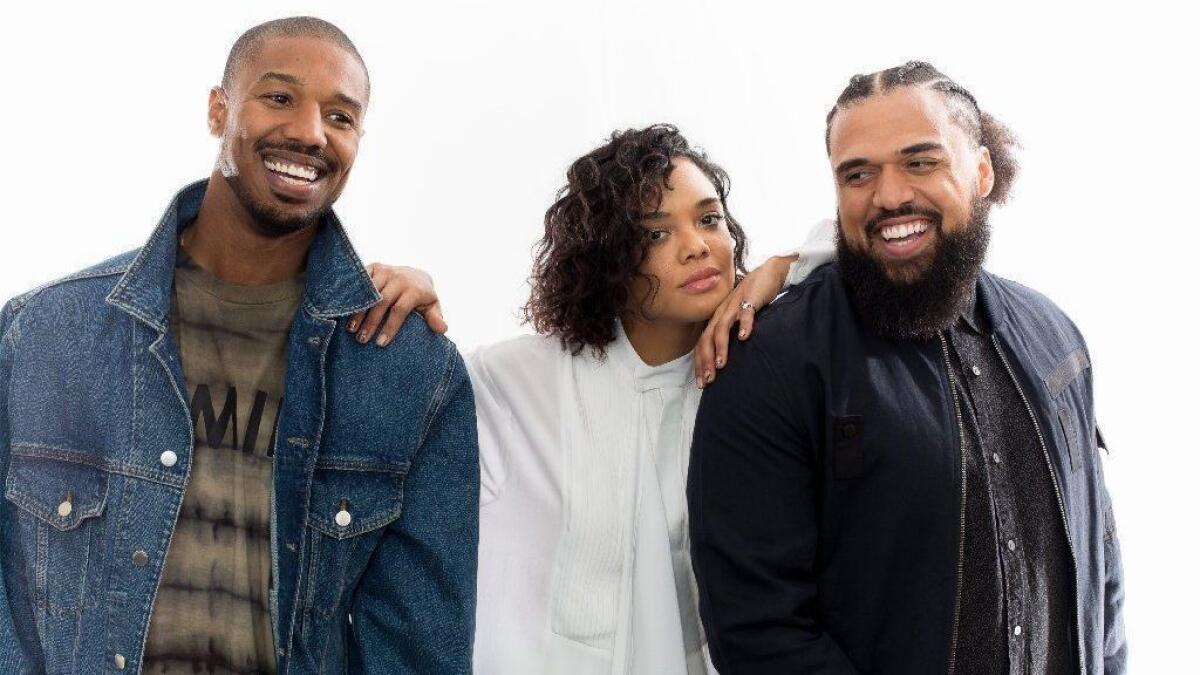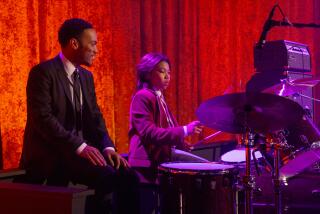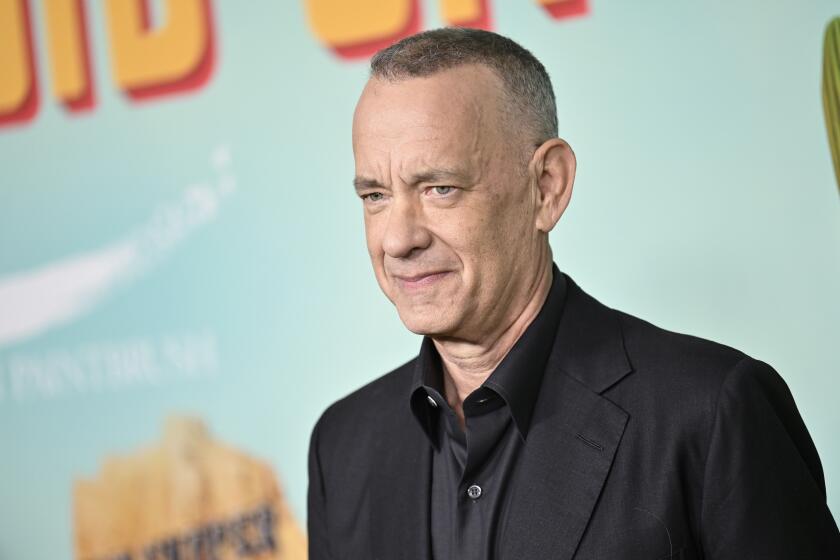With ‘Creed II,’ love is as important as boxing

“Creed II” returns with a mission.
Not just to continue the successful extension of the over-40-year-old “Rocky” franchise, but to further explore a deep, relatable and unmistakably real relationship between two young black professionals. It’s the sort of love story rarely seen in mainstream Hollywood films, period, let alone in the few pictures centered on folks of color.
A pre-“Black Panther” Ryan Coogler had revived the “Rocky” franchise with “Creed” in 2015 to critical praise and an impressive box office take of $109.8 million domestically. Michael B. Jordan solidified his stardom in the title role, and the picture even garnered an Oscar nomination (and Golden Globe win) for Sylvester Stallone’s Rocky Balboa reprisal, nearly 40 years after his first nomination for the role.
And like “Rocky” before it, “Creed” emerged as a careful balance of underdog sports movie and intimate romantic study. The sequel again finds its emotional core in Adonis Creed’s personal life, as he begins building a family with his longtime musician girlfriend Bianca (Tessa Thompson).
Of course there’s also some boxing. Newly crowned light heavyweight champ under the tutelage of Rocky (Stallone), Adonis is challenged by Viktor Drago (Florian Munteanu), the son of Ivan (Dolph Lundgren). That plotline connects back to “Rocky IV,” in which Ivan, as the Soviet Union’s best athlete, fatally defeated Creed’s father, Apollo (Carl Weathers). Balboa avenged Apollo’s death in a follow-up match.
Together, Adonis and Bianca must decide if a fight that could end Creed’s life — as it did his father’s — is truly worth it.
Jordan said he had “no hesitations whatsoever” about jumping back into the “Creed” character, even though the film would be his first sequel. The same was true for Thompson, who said she “loved that [Bianca] resembled a woman that you might know, in a way I haven’t seen particularly in narratives around sports.”
But the stars knew that another notch in the franchise’s belt would work only with the right director, since Coogler (who returns as an executive producer) was not available. The studio, with the blessings of Stallone, Coogler, Jordan and Thompson, landed on Steven Caple Jr.
Like Coogler with “Creed,” “Creed II” is Caple’s sophomore feature. His debut film, “The Land,” about four teenage boys in Cleveland pursuing a dream life of professional skateboarding, premiered at 2016’s Sundance. It was produced by hip-hop star Nas and featured an ensemble cast including Jorge Lendeborg Jr., Machine Gun Kelly and Erykah Badu.
Coming from the indie film world, Jordan felt the two had “a lot in common, and that’s always good when making a film,” he said. “He’s somebody else that understands the character of Adonis and what he would be going through. He’s another young black male in America going through a rise of his own, trying to figure out who he is.”
Caple says the decision wasn’t an easy one. He knew that following in Coogler’s footsteps would be no easy feat, so there was “complete hesitation.”
“You don’t want to mess up something that is already good,” he said as a fan of the entire franchise. “I thought that [a sequel] could be a huge hit, or it might backfire.”
But after reading Stallone’s initial draft of the sequel’s script, and having a conversation with him and Jordan, Caple felt more at ease. He knew he could make the film his own without the burden of living up to what Coogler had accomplished.
“They said, ‘The door is open and we’ll follow your lead’ — that felt reassuring,” he said. “When I saw they were really lenient to letting me rock, I felt comfortable.”
Once signed on, Caple strove to set aside both the pressure that comes with a studio-produced project and the expectations of an opinionated fanbase.
“People have their favorite characters and moments and even favorite shots,” he said, “I wanted to make sure I paid homage to those things but put my own stamp on it.”
While the director handles with aplomb the series’ all-important fight scenes and the reintroduction of a handful of legacy characters, including Drago, he took particular care when it came to the evolution of Adonis and Bianca’s relationship. As Caple saw it, it was crucial to home in “on what’s important in a film: the heart.”
Caple explained, “There was a lot of conversations with Mike and Tessa about, ‘How do we show the maturity of their relationship?’ How do we go from ‘I, I, I,’ to ‘We, we, we’? She wants her career, he wants his legacy, and what brings them together is the family.”
Jordan added: “We wanted to let people know what that looks like, when two professionals want to be successful in their own right and have their own agency. But at the same time, how do you compromise and make a relationship work when you’re on that path to success?”
Adonis and Bianca’s relationship is perhaps where Caple’s experience most came into play. He’s in a relationship, and has been for 15 years, with his high school sweetheart. And when he originally sparked to the series, it was the love between Balboa and Adrian in “Rocky” and Adonis and Bianca in “Creed” that he most responded to.
“I just wanted to put my own spin on it and talk to this generation,” he said. “I wanted to capture something for this generation and showcase their relationship and smaller themes because everything was so hyped up about the big fights. But the intimacy — in the proposal scene, for example — I pulled from my own life.”
That authentic intimacy helps “Creed II” deliver a fresh and much needed representation of black love on screen — one between two young people committed to each other who aren’t perfect and don’t have it all together.
“To me, the imperfections make the relationship healthy,” Caple continued. “That and the genuine conversations that they have.
“And all of these things that emphasized the growing pains of a relationship, a lot of it was in the script, but we’d have conversations right before set. We’d spend 20 minutes before shooting talking about the scene — where are we going to be, how we’re speaking to our people and showcasing black love to change the narrative about how we’re perceived on screen.”
Because the film is called “Creed II,” it was obvious that Adonis would continue to have control and voice in his life developments. But that sort of character development wasn’t so certain for Bianca, especially if Hollywood’s history with girlfriend and wife characters was to serve as the prototype.
“Tessa and I didn’t want to fall into the cliche of ‘I’m just a girl and I want to support him,’” Caple said. “[We wanted to] break some of the norms we see in these types of characters.”
In fact, more depth and agency for Bianca was of the utmost importance, Thompson said. She wanted her to “occupy her own narrative,” as the film extends beyond a pat “happily ever after” ending.
“I wanted to make sure that she continued to make music and, regardless of her being a mother, that she doesn’t change and her whole life isn’t centered around domesticity.”
She’d often joke with Jordan: “Alright, I’ll be pregnant, but I want to do some more stuff.”
“I know people are going to come in asking if it’s better than ‘Creed,’ but I care about it being relatable. If we fail at that, we don’t have a movie.”
— Steven Caple Jr., director of “Creed II”
It was also important to Thompson to continue to treat her character, who in the first film was managing progressive hearing loss, with care. In the sequel, Bianca can hear only with a hearing aid.
“Hearing loss is incredibly difficult to understand. And in the process of making this movie, I’m just beginning to understand even how hearing works,” she said. “We were trying to navigate how to tell that story with honesty and authenticity but also make it accessible to an audience, because it is so complicated.”
They consulted with hearing experts, audiologists and people from the signing community, “and I hope it speaks to folks who have been in similar situations.”
As audiences of all kinds begin to see the film, Caple just hopes they’re “able to relate.”
“I know people are going to come in asking if it’s better than ‘Creed,’” he said, “but I care about it being relatable. If we fail at that, we don’t have a movie.”
Thompson acknowledged the cards stacked against Caple “coming into a franchise [and having] to satisfy all of the players involved who have their own idea of what they want to do, myself included.
“But he was really good at hearing everybody and also being steadfast in his vision,” she said. “And to me, the beauty of this film, and all of the ‘Rocky’ films, is that they’re at their strongest when they feel like movies about people and relationships and love and the backdrop is boxing. I think that’s when they really, really work.”
At the core of every picture in this particular franchise, she continued, is the breakthrough spirit of a dark horse.
“Someone either behind the lens or in front of it [has always been] new to the game that has a lot of skin in the game because of it. They’re underdogs. The genesis and origin story of this is somebody who by hook or crook does something remarkable.
“I think we did that with the first movie, and Steven did that again with this one.”
Get your life! Follow me on Twitter (@TrevellAnderson).
More to Read
Only good movies
Get the Indie Focus newsletter, Mark Olsen's weekly guide to the world of cinema.
You may occasionally receive promotional content from the Los Angeles Times.










